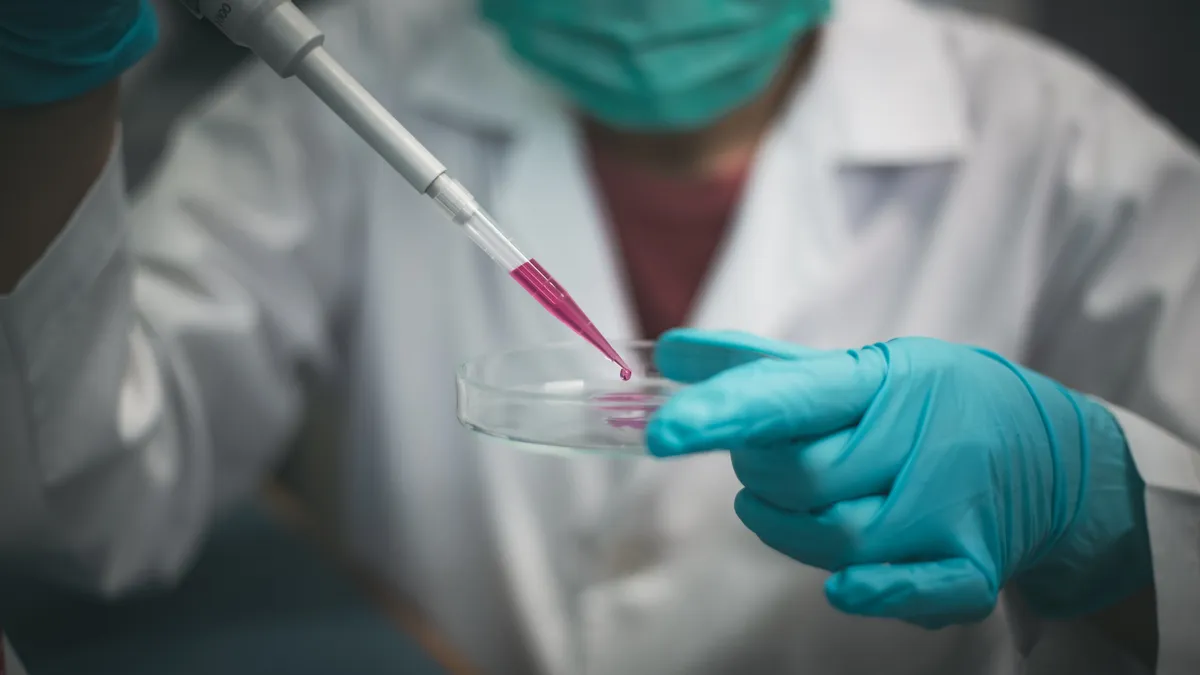A patient’s immune system is one of the most potent weapons in the fight against cancers. Now, a fast-growing class of new drugs — protein degraders — is taking a page from a similar playbook by hijacking the trash disposal system inside cells to eliminate disease-causing proteins. It’s also an approach that could ultimately tackle thousands of diseases.

If all goes as planned, Arvinas phase 3 metastatic breast cancer drug, vepdegestrant, could be the first of these drugs to gain approval as early as 2025, swinging open the door to a new wave of therapies treating cancer, neurological disorders and more.
“That would be a very exciting transition, not just for the company, but for the whole protein degradation space,” said Arvinas CEO John Houston.
The technology traces back to two biochemists — Craig Crews, a Yale University professor, and Raymond Deshaies, a research exec at Amgen — who pioneered protein degrader drugs to harness the proteasome ubiquitin system.
“When proteins are past their lifespan, they get dragged off to this proteasome, the garbage disposal unit, and they're broken down into peptides and flushed back into the cell for further rounds of protein synthesis,” Houston said.
Crew’s initial work essentially slammed the trash can lid shut, causing proteins to pile up inside the cell until it burst, destroying it. The discovery laid the groundwork for Amgen’s proteasome inhibitor for multiple myeloma, Kyprolis, which was approved in 2012.
Crews then pivoted to a different approach, tagging these proteins to trick the body into doing the dirty work of ferrying disease-causing proteins off to the cellular dump. He founded Arvinas in 2013, and the company began to develop its pipeline of proteolysis-targeting chimera protein degraders, Houston said.
"All the Big Pharma companies have some kind of connection or involvement with protein degradation, either through their own research or through partnerships."

John Houston
CEO, Arvinas
The most advanced candidate, vepdegestrant, which Arvinas is working on through a collaboration worth up to $2.4 billion with Pfizer, is being tested as both a stand-alone therapy and as a combination treatment for a challenging type of ER+/HER2 metastatic breast cancer. In preclinical studies, the drug performed better than the standard-of-care fulvestrant when used alone and with a CDK4/6 inhibitor, earning it a fast track designation from the FDA.
The company’s other contenders include ARV-766, a prostate cancer treatment that’s out-licensed to Novartis, and a BCL6 protein degrader targeting blood cancers, which could enter the clinic this year. The company’s earlier-stage hopefuls include therapeutics for neurological diseases, such as Parkinson’s and Huntington’s disease.
Competition builds
Protein degraders have advantages over traditional drugs because they purge problem proteins instead of just inhibiting them, Houston said. They also enable scientists to target wily proteins that have evaded small molecule drugs and can help overcome treatment-resistant disease. Their ability to slip past the blood-brain barrier makes them particularly promising in brain diseases. Vepdegestrant didn’t appear to produce any technology-related side effects in early studies, Houston said. The only effects occur from eliminating the target.
“If you get rid of androgen, you see androgen-related effects. If you get rid of estrogen, you'll see estrogen-depletion type of effects. But that's also what you want to see in that disease setting,” Houston said.
This could be a boon for patients.
“This is really important for breast cancer patients dealing with the disease,” Houston said. “They don't want a drug that also makes them feel really unwell.”
The early successes of these drugs turned heads.
“When we first started, we were the only company in the space,” Houston said, pointing out that the landscape changed around 2015. “Now, when you look at it, all the Big Pharma companies have some kind of connection or involvement with protein degradation, either through their own research or through partnerships.There's probably in the range of 50 to 60 different companies that say they're in protein degradation in some shape or form, which just tells you that it's a mature enough technology now that big companies and smaller companies want to invest in it.”
Other contenders in the space include C4 Therapeutics, Ranok Therapeutics and Kymera Therapeutics. One of the most common differentiating factors between companies is how they deploy the technology — and the targets they pick.
Companies are working on a growing range of diseases
“Choosing which targets to work on, choosing which diseases to be in becomes ever more critical if you want to carve out a space that's uniquely yours. So, you'll find different companies deploying their resources into cardiovascular or cancer or some other areas,” Houston said.
Ultimately, protein degraders could treat thousands of diseases that have intracellular targets.
“They've got the real potential to offer a significant alternate modality of therapy for patients, certainly in areas where there's high resistance, where there's a need for a new mechanism to approach the target,” Houston said. “That's why people are so excited about them. We're really just scraping the surface.”


















